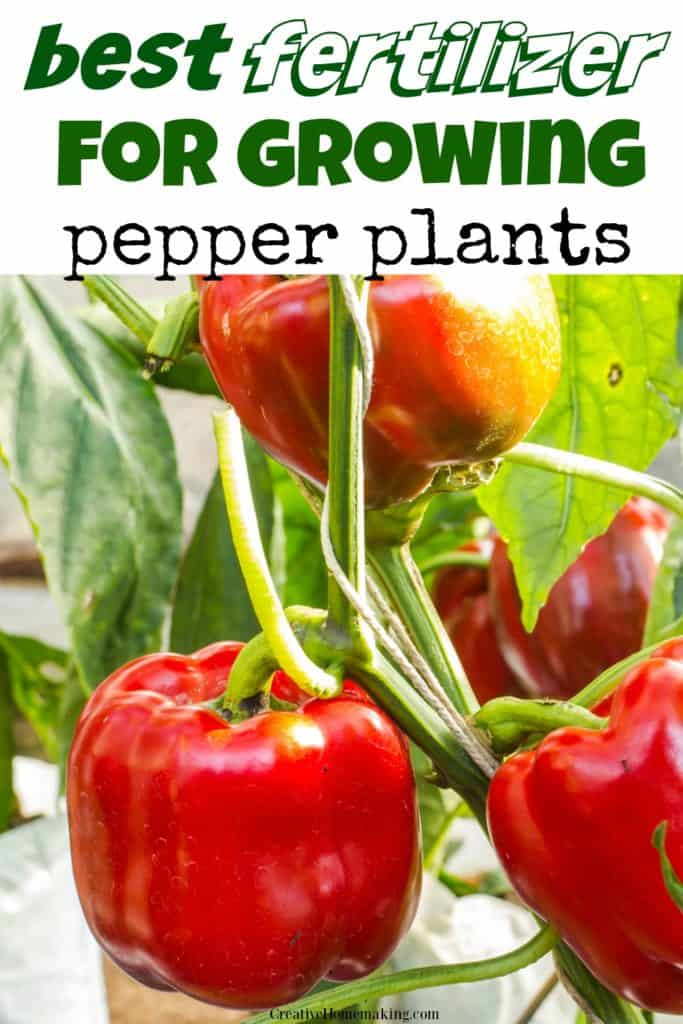Best Fertilizers for Peppers: Accomplish Superior Results in Your Garden
Best Fertilizers for Peppers: Accomplish Superior Results in Your Garden
Blog Article
Organic Vs. Synthetic Fertilizers: Which Is Best for Nurturing Healthy And Balanced Pepper Plants?
In the world of supporting healthy and balanced pepper plants, the choice between natural and synthetic plant foods stands as a crucial choice with significant implications. While both alternatives aim to provide important nutrients to support plant development, the nuances of their effect on the soil, plant wellness, and the environment trigger a discussion that echoes throughout the gardening area. Understanding the unique advantages and potential mistakes of each fertilizer kind is essential for pepper farmers looking for to optimize their yields while preserving a sustainable and eco-conscious technique.
Benefits of Organic Plant Foods
Organic fertilizers use an environmentally-friendly and sustainable approach to nourishing pepper plants, giving necessary nutrients without the usage of artificial chemicals. These natural fertilizers are originated from organic sources such as compost, manure, bone dish, and seaweed, promoting dirt health and biodiversity. Unlike artificial plant foods, natural choices launch nutrients slowly, making sure a stable and balanced supply for pepper plants to grow.
One considerable benefit of natural fertilizers is their capacity to improve soil framework and water retention. By boosting dirt wellness, organic fertilizers advertise useful microbial task, which aids in nutrient uptake by pepper plants. In addition, natural fertilizers decrease the threat of chemical run-off, safeguarding water sources from pollution and guarding the environment.
Furthermore, natural fertilizers contribute to lasting dirt fertility by advertising the development of helpful dirt organisms. These organisms assist break down raw material, releasing nutrients in a kind that is quickly available to pepper plants. best fertilizers for peppers. By cultivating a healthy and balanced dirt ecological community, organic plant foods support sustainable pepper growing methods that profit both plants and the setting
Downsides of Artificial Plant Foods
Artificial fertilizers, in comparison to their natural equivalents, present numerous drawbacks when used to nourish pepper plants, affecting both plant health and ecological sustainability. One significant disadvantage of synthetic plant foods is their tendency to seep nutrients from the dirt quickly.
Additionally, the overuse of synthetic fertilizers can add to water air pollution. Excess fertilizers not soaked up by plants can remove into water bodies, leading to eutrophication, where algae flowers diminish oxygen levels in the water, damaging marine life. In addition, artificial fertilizers are typically derived from non-renewable sources, such as nonrenewable fuel sources, adding to carbon discharges and ecological degradation throughout their production.
Nutrient Absorption Comparison
When comparing organic and artificial fertilizers in terms of nutrient absorption, organic fertilizers have the benefit of offering a more balanced and slow-release resource of nutrients. Organic fertilizers have a selection of macro and micronutrients that are not only advantageous for the plants however also advertise healthy soil microbial task, which helps in nutrient uptake.
Additionally, organic plant foods boost soil framework and water retention ability, permitting pepper plants to gain access to nutrients more effectively. This improved dirt quality facilitates root growth, allowing far better nutrient absorption. Synthetic fertilizers, although initially boosting plant development as a result of their high nutrient focus, might site here hinder long-lasting nutrient absorption by derogatory soil health and wellness in time.
Ecological Impact Considerations

On the various other hand, artificial fertilizers, although often even more concentrated and promptly offered to plants, can have harmful results on the setting otherwise used effectively (best fertilizers for peppers). Their manufacturing requires high power inputs, causing greenhouse gas emissions and adding to climate adjustment. The overflow of excess artificial fertilizers can infect water resources, leading to eutrophication and harming marine environments.
Finest Fertilizer Practices for Peppers
To accomplish this, it is crucial to comply with ideal fertilizer techniques tailored to the certain requirements of pepper plants. One essential practice is to carry out a dirt test prior to using any fertilizers.
An additional crucial technique is to feed pepper plants at the appropriate time. Commonly, peppers take advantage of obtaining plant food at planting and afterwards his comment is here again when they start to flower. Over-fertilizing can bring about vitamins and mineral inequalities and damage the plants, so it is important to follow advised application rates.
Additionally, selecting a well balanced plant food with an NPK ratio that matches pepper plants' demands is basic. Organic fertilizers, such as compost or manure, can be exceptional selections as they release nutrients slowly and enhance dirt structure over time. Synthetic fertilizers can provide a quick nutrient boost when required. Inevitably, combining artificial and natural plant foods judiciously can help support healthy pepper plants while lessening ecological influence.
Conclusion

Organic fertilizers offer an environmentally-friendly and lasting technique to nourishing pepper plants, giving important nutrients without the use of synthetic chemicals. Unlike synthetic fertilizers, natural choices launch nutrients gradually, guaranteeing a consistent and well balanced supply for pepper plants to grow.
Synthetic fertilizers, in contrast to their natural equivalents, position various drawbacks when utilized to nourish pepper plants, impacting both plant health and wellness and ecological sustainability. When comparing organic and artificial fertilizers in terms of nutrient absorption, organic fertilizers have the benefit of offering a more well balanced and slow-release resource of nutrients.In addition, natural plant foods boost dirt framework and water retention capacity, permitting pepper plants to access nutrients extra efficiently.
Report this page